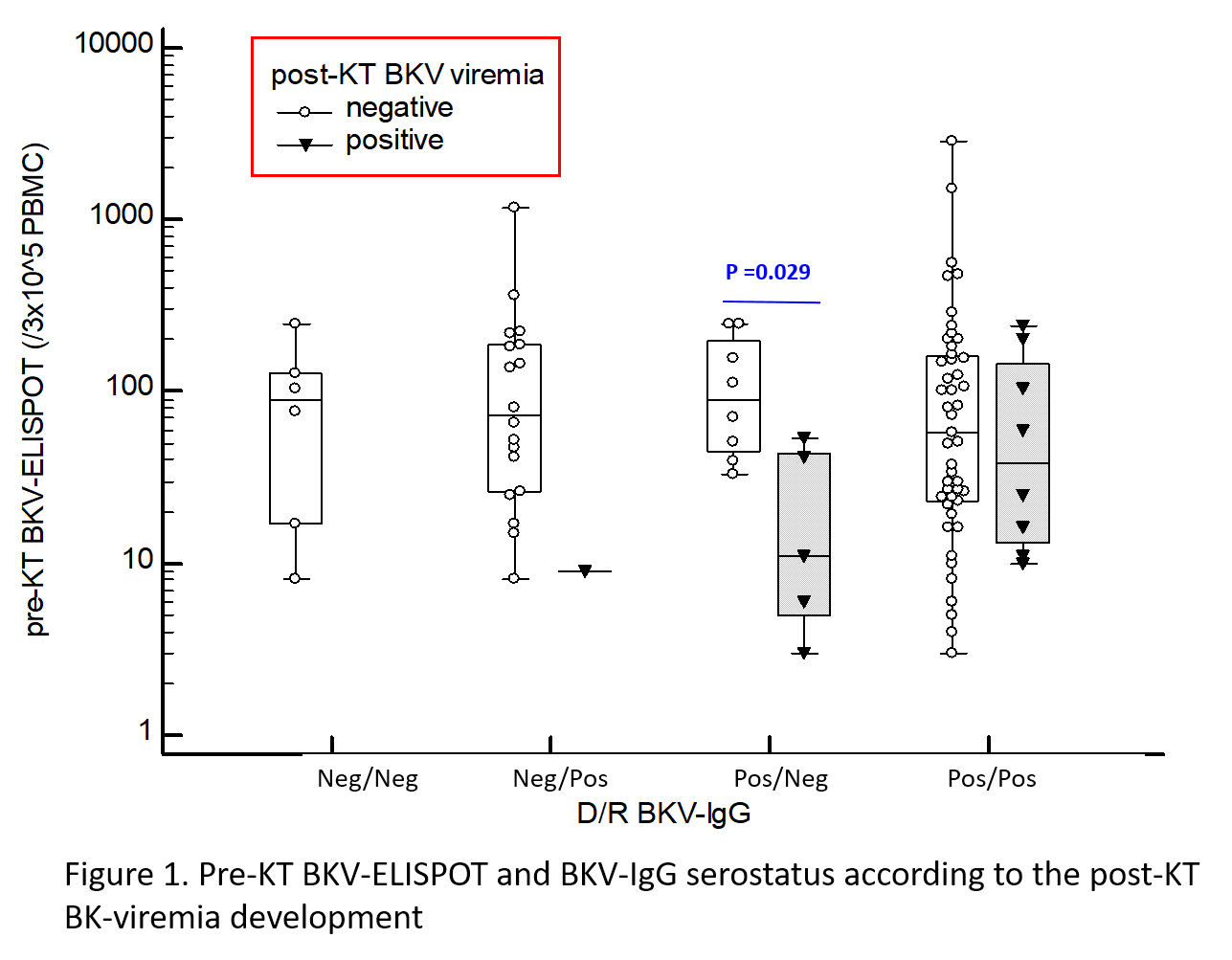Pretransplant BKV-IgG Serostatus and BKV-Specific ELISPOT Assays for the Prediction of BKV Infection
1Department of Biomedical Science, Graduate School, Catholic University of Korea, Seoul 137-040, Korea, Republic of, 2Department of Laboratory Medicine, Catholic Kwandong University of Korea, Incheon, Korea, Republic of, 3Department of Laboratory Medicine, Catholic University of Korea, Seoul 137-040, Korea, Republic of
Meeting: 2020 American Transplant Congress
Abstract number: 493
Keywords: Immunoglobulins (Ig), Kidney transplantation, Polyma virus, T cell activation
Session Information
Session Time: 3:15pm-4:45pm
 Presentation Time: 3:39pm-3:51pm
Presentation Time: 3:39pm-3:51pm
Location: Virtual
*Purpose: BK Polyomavirus (BK) can lead to major infectious complications and damage to the graft in kidney transplantation (KT). We investigated whether pretransplant BK serostatus or BK-specific cellular immunity predicts post-transplant BK-viremia or BK-associated nephropathy (BKVAN).
*Methods: We included 93 donor-recipient pairs who underwent KT between May 2016 and March 2018. Forty-four 44 healthy controls were included as control. Pretransplant BKV-IgG ELISA and BKV-specific IFN-γ ELISPOT assays against five BK virus antigens (LT, ST, VP1, VP2 and VP3) were performed. The minimum follow-up time was 6 months (6-24 months). BK-viremia was defined as the blood BKV-DNA value higher than 4 log copies/mL. When BK-viremia was sustained after one month, we performed allograft biopsy and diagnosis of BKVN was confirmed.
*Results: BKV-IgG was detected in 74 (79.6%) KT recipients (KTR) and 99 (72.3%) healthy donors and controls (P>0.05). IgG values were significantly higher in KTRs compared to the normal subjects (P<0.05). Of 93 patients, BK-viremia was developed in 14 (15.1%) patients and 5 (5.4%) patients were diagnosed as BKVAN. Although pretranspalnt BKV-IgG serostatus in recipients and donors were not associated with BK-viremia (P = 0.1259 and P = 0.0722, respectively), high BKV-IgG levels in donors were associated with post-KT BK-viremia (P = 0.0045). The distribution of BKV-ELISPOT results were wider in KTR than in healthy controls. In 93 KTRs, decreased pretransplant BKV-ELISPOT results against St and VP3 predicted BK-viremia (P = 0.0394 and P = 0.0137, respectively), and decreased sum of BKV-ELISPOT results predicted BKVAN (P <0.05). In 13 KTR with BKV-IgG serostatus (D+/R-), decreased pre-KT BKV-ELISPOT results predicted post-KT BK-viremia (P = 0.029).
*Conclusions: Pretransplant BKV-ELISPOT assay according to the BKV-IgG serostatus might be effective in predicting posttransplant BKV infection. Further studies in association with posttransplant BKV immune monitoring are needed.
To cite this abstract in AMA style:
Bae H, Jang J, Lee H, Yun S, Oh E. Pretransplant BKV-IgG Serostatus and BKV-Specific ELISPOT Assays for the Prediction of BKV Infection [abstract]. Am J Transplant. 2020; 20 (suppl 3). https://atcmeetingabstracts.com/abstract/pretransplant-bkv-igg-serostatus-and-bkv-specific-elispot-assays-for-the-prediction-of-bkv-infection/. Accessed February 21, 2026.« Back to 2020 American Transplant Congress

